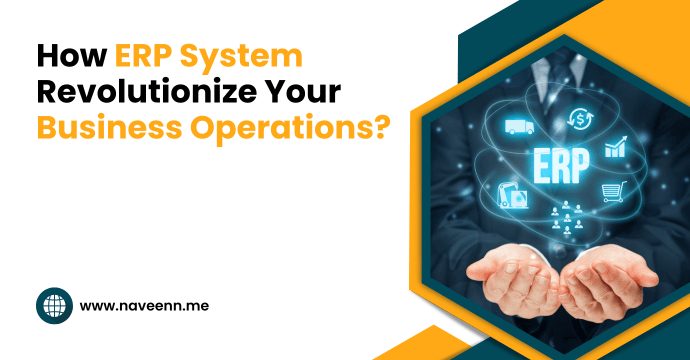In today’s fast-paced business environment, organizations are constantly seeking ways to improve efficiency, streamline processes, and gain a competitive edge. An Enterprise Resource Planning (ERP) system is one of the most powerful tools for accomplishing these objectives.
ERP systems have become the backbone of modern enterprises, providing a comprehensive solution that integrates various business functions into a single, unified system.
In this blog, we will explore how ERP systems can revolutionize your business operations and help you stay ahead in the competitive landscape.
What is an ERP System?
An ERP system is a software platform that integrates various business processes, including finance, human resources, supply chain, manufacturing, and customer relationship management (CRM), into a single system. This integration allows for seamless communication and data sharing between departments, providing a holistic view of the organization’s operations. With an ERP system, businesses can automate routine tasks, improve decision-making, and enhance overall efficiency.
The Benefits of Implementing an ERP System
Streamlined Business Processes
One of the most significant benefits of an ERP system is the ability to streamline business processes. ERP eliminates the need for disparate software and manual data entry by integrating various functions into a single system.
This leads to increased efficiency, as information flows seamlessly between departments. For example, when a sales order is placed, the ERP system automatically updates inventory levels, generates an invoice, and schedules production.
This level of automation reduces errors, saves time, and ensures that all departments are working with the same up-to-date information.
Improved Decision-Making
ERP systems provide real-time data and analytics, giving decision-makers access to critical information at their fingertips. With a centralized database, managers can generate reports, track key performance indicators (KPIs), and analyze trends across different departments.
This data-driven approach enables businesses to make informed decisions quickly, leading to better outcomes. For example, a manufacturer can use ERP data to identify bottlenecks in the production process and make adjustments to improve efficiency.
Similarly, a retailer can analyze sales data to determine which products are performing well and adjust inventory levels accordingly.
Enhanced Collaboration and Communication
ERP systems break down silos within organizations by facilitating collaboration and communication across departments. Since all employees have access to the same information, there is less room for miscommunication and duplication of efforts.
For example, the finance team can easily access sales data to forecast revenue, while the HR department can track employee performance and productivity.
This level of transparency fosters a culture of collaboration, where teams work together to achieve common goals.
Increased Efficiency and Productivity
By automating routine tasks and reducing manual data entry, ERP systems significantly increase efficiency and productivity. Employees can focus on more strategic activities rather than spending time on repetitive, mundane tasks.
For example, an ERP system can automate the process of generating purchase orders, tracking shipments, and managing inventory levels.
This automation not only conserves time but also minimizes the likelihood of human error. As a result, businesses can operate more efficiently and deliver products and services to customers faster.
Scalability and Flexibility
As businesses grow, their operational needs evolve. ERP systems are designed to be scalable and flexible, allowing organizations to add new modules and functionalities as needed.
Whether you are expanding into new markets, launching new products, or increasing production capacity, an ERP system can adapt to your changing needs.
This scalability ensures that your ERP system continues to support your business as it grows, without the need for costly upgrades or replacements.
Improved Customer Service
In today’s customer-centric world, delivering exceptional customer service is essential for success. ERP systems play a crucial role in enhancing customer service by providing a 360-degree view of the customer.
With access to real-time data on customer interactions, order history, and preferences, businesses can respond to customer inquiries quickly and accurately.
Additionally, ERP systems can help businesses manage customer relationships more effectively by automating tasks such as sending follow-up emails, tracking customer satisfaction, and managing service requests. This results in greater customer satisfaction and stronger loyalty.
Read More: A Complete Guide to Implement AI and ML in Your Mobile App
Implementing an ERP System: Key Considerations
While the benefits of an ERP system are clear, implementing one requires careful planning and consideration. Here are some important factors to keep in mind:
- Choose the Right ERP Vendor: Not all ERP systems are created equal. It’s essential to choose a vendor that offers a solution tailored to your industry and business needs. Consider factors such as scalability, ease of use, and customer support when selecting an ERP vendor.
- Involve Key Stakeholders: Successful ERP implementation requires buy-in from all departments. Involve key stakeholders in the decision-making process and ensure they understand the benefits of the system.
- Plan for Change Management: Implementing an ERP system often involves significant changes to business processes. Develop a change management plan to address potential challenges and ensure a smooth transition.
- Provide Adequate Training: To maximize the benefits of an ERP system, employees need to be trained on how to use the system effectively. Invest in training programs to ensure your team is equipped with the skills they need.
Conclusion
In conclusion, ERP systems have the potential to revolutionize business operations by streamlining processes, improving decision-making, and enhancing efficiency. By integrating various functions into a single system, businesses can operate more effectively and respond to market demands more quickly.
Whether you are a small business looking to scale or a large enterprise seeking to optimize operations, an ERP system can provide the tools you need to achieve your goals.
As you consider implementing an ERP system, keep in mind the importance of choosing the right vendor, involving key stakeholders, and planning for change management. With the right approach, an ERP system can be a game-changer for your business.
